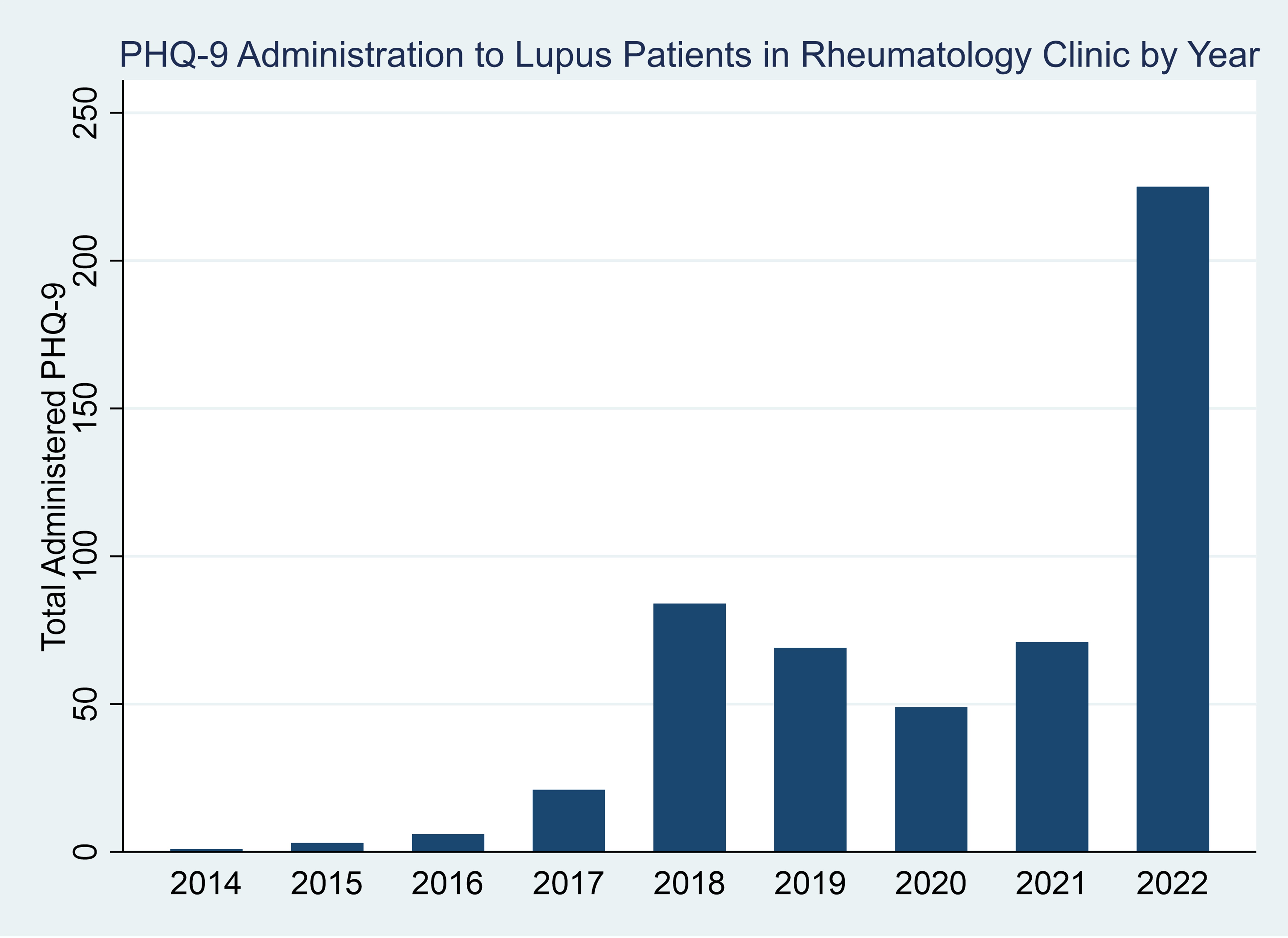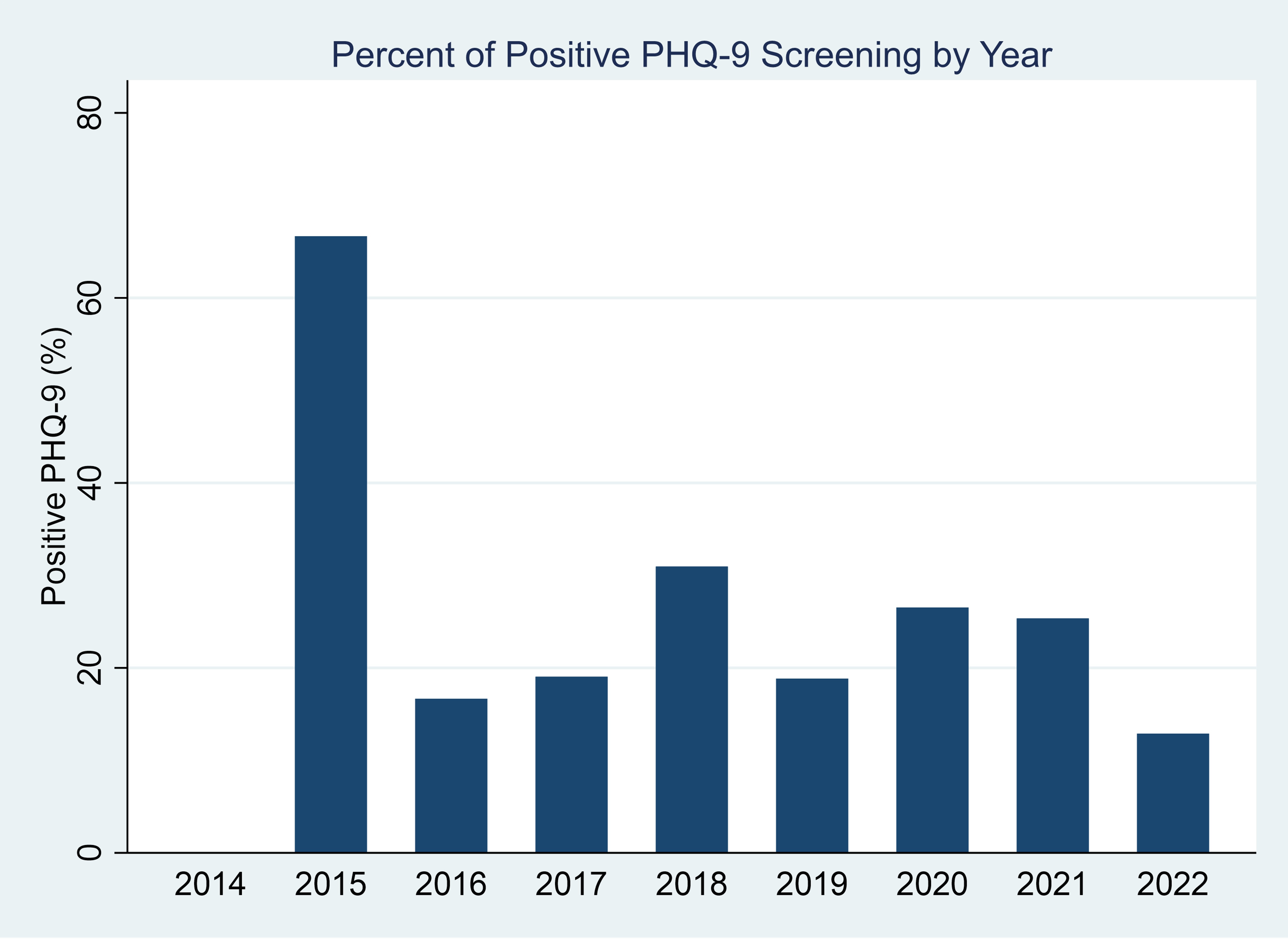Session Information
Date: Friday, March 31, 2023
Title: Plenary Abstracts Session II
Session Type: Plenary Session
Session Time: 2:30PM-3:00PM
Background/Purpose: Patients with chronic rheumatic conditions, particularly lupus, have higher rates of depression, which significantly impacts their lives and can lead to poor medication compliance and increased disease activity. Regular mental health screening is essential to optimize the care for these patients. This study aims to evaluate an automated electronic depression screening process and its integration into routine clinical care.
Methods: Patients >12 years old with a diagnosis of lupus who were evaluated at a tertiary pediatric rheumatology clinic between 2014 and 2022 were included. Depression screening using the Patient Health Questionnaire-9 (PHQ-9) was completed by paper screenings annually, transcribed into the electronic health record (EHR), and later automated in 2022 to be completed at every visit via i-Pad tablet. Positive scores were defined as score >10, or if the patient endorsed suicidality. During the automated phase of this study, an intrusive alert was displayed for positive screens during a providers workflow. Data were extracted from the EHR and providers were surveyed about the new workflows.
Results: During the study period, 149 patients completed 529 screenings. PHQ-9 administration increased from 1 patient in 2014 to 21 in 2017; after automation, screenings increased to 225 (p < 0.01) (Figure 1). Percent positive screening increased from 0% in 2014 to 25-30% in 2018-2021 and decreased to 12% in 2022 (p < 0.01) (Figure 2). The incidence of positive screens during the study period was 20%, whereas the prevalence of positive PHQ-9 screen for a single patient was 38%. The median PHQ-9 score was 3 [0, 6], and scores decreased as screening increased (Figure 3). Ten automated alerts were triggered; 9 (90%) met with psychology or social work, 9 (90%) completed suicide risk assessment, which included the Ask Suicide-Screening Questions & the Columbia Suicide Severity Rating Scale. Providers expressed satisfaction with screening and did not have objections to intrusive alerts.
Conclusion: Results demonstrate that automated screening procedures maximize the number of patients screened for depression and minimize demand on support staff. Screening at each visit provides more opportunities to identify and treat depression. Such procedures may be emulated at parallel institutions to streamline mental health screening efforts while minimizing demands.
 Legend: PHQ-9 = Patient Health Questionnaire-9
Legend: PHQ-9 = Patient Health Questionnaire-9
 Legend: PHQ-9 = Patient Health Questionnaire-9
Legend: PHQ-9 = Patient Health Questionnaire-9
 Legend: PHQ-9 = Patient Health Questionnaire-9
Legend: PHQ-9 = Patient Health Questionnaire-9
Disclosures: L. Harper: None; A. Goldstein-Leever: None; J. Gallup: None; V. Sivaraman: None; S. Ardoin: None; K. Driest: None; E. Mulvhihill: None; A. Taxter: None.
To cite this abstract in AMA style:
Harper L, Goldstein-Leever A, Gallup J, Sivaraman V, Ardoin S, Driest K, Mulvhihill E, Taxter A. Implementation of Automated Depression Screening in Patients with Lupus in a Tertiary Pediatric Rheumatology Clinic [abstract]. Arthritis Rheumatol. 2023; 75 (suppl 4). https://acrabstracts.org/abstract/implementation-of-automated-depression-screening-in-patients-with-lupus-in-a-tertiary-pediatric-rheumatology-clinic/. Accessed .« Back to 2023 Pediatric Rheumatology Symposium
ACR Meeting Abstracts - https://acrabstracts.org/abstract/implementation-of-automated-depression-screening-in-patients-with-lupus-in-a-tertiary-pediatric-rheumatology-clinic/
